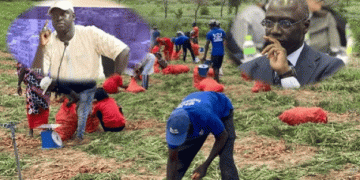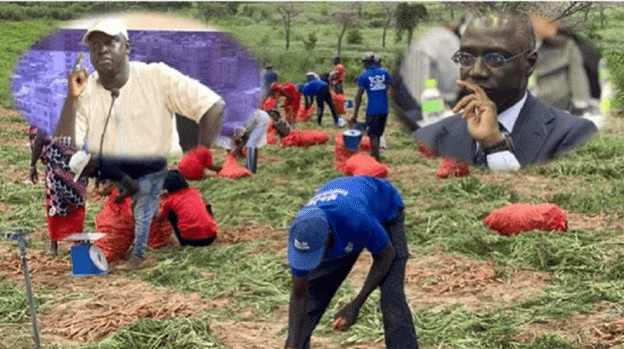The carrot industry in Senegal faces significant challenges, as highlighted by Serigne Mansour Guèye, CEO of Global Partnership for Agriculture. In a recent interview, Guèye expressed his frustration with the current state of carrot prices and the manipulation of the market by importers. Alongside his brother Maguèye Guèye, Serigne Mansour is one of only two carrot producers in Senegal, a sector they have invested in despite the difficulties of producing during the rainy season.
Guèye’s primary concern is the disparity between production costs and retail prices. Local producers sell carrots at 600 FCFA per kilogram directly from the farm, yet consumers often pay 2,000 FCFA per kilogram during the rainy season. This price inflation is largely driven by certain importers who, according to Guèye, are undermining local production by flooding the market with imported carrots from countries like Morocco. Despite a local supply of carrots, importers exploit market opportunities for personal gain, a practice that Guèye believes shows a lack of respect for Senegalese authorities and consumers.
The Impact on Senegalese Carrot Production
Senegalese carrot production is already limited, with only a handful of farmers daring to produce during the rainy season to demonstrate that year-round production is possible. This production is essential for the country’s goal of food self-sufficiency. However, the absence of cold storage and other preservation facilities remains a significant challenge for producers like Guèye. Without the ability to store excess produce, farmers are forced to sell their carrots quickly, often at lower prices, to prevent spoilage. This creates a cycle of financial strain for producers who are already struggling to compete with cheaper imported products.
The call for increased government support, particularly from the Ministry of Commerce, is critical. Guèye argues that the government must intervene to regulate prices and ensure a fair market for local producers. He suggests that the Ministry of Commerce should set strict price controls to prevent price gouging by importers and regulate the timing of carrot imports to align with the domestic harvest cycle.
Addressing the Role of Imports
One of the main issues Guèye emphasizes is the manipulation of carrot import quotas. While Senegal’s import quotas are regulated by the Agricultural and Rural Management Agency (ARM), these quotas are often ignored, leading to an oversupply of imported carrots even during the local harvest season. This oversupply drives down prices for local producers and further discourages investment in domestic agriculture.
Guèye also expressed concerns about the political connections between importers and government officials, which may contribute to the lack of enforcement of import regulations. Despite these challenges, he remains committed to supporting the development of Senegal’s carrot industry. His strategy includes ensuring that locally produced carrots are available in markets across the country, proving that Senegal is capable of meeting its own carrot demand without relying on imports.
The Path Forward
To address these challenges, Guèye calls for a multi-pronged approach. First, the government needs to invest in cold storage facilities to enable producers to store carrots and other perishable goods for longer periods. This would help reduce the pressure to sell quickly at low prices. Second, price regulation is essential to prevent excessive markups on locally produced carrots. Third, stricter enforcement of import quotas is needed to prevent the market from being flooded with imported goods during the local harvest.
Guèye also urges the President and Prime Minister to take action, arguing that they may not be fully aware of the extent of the issue. If the government steps in to protect local production, Senegal could move closer to achieving food self-sufficiency, reduce dependence on imports, and create a more stable agricultural economy.
The commercialization of carrots in Senegal is at a crossroads. Without immediate government intervention to regulate prices, enforce import quotas, and support local producers with cold storage facilities, the future of Senegal’s carrot industry is in jeopardy. Serigne Mansour Guèye’s call to action serves as a reminder that achieving food self-sufficiency requires coordinated efforts between farmers and policymakers. By prioritizing local production and safeguarding it from external threats, Senegal can strengthen its agricultural sector and provide more affordable, high-quality produce for its citizens.































